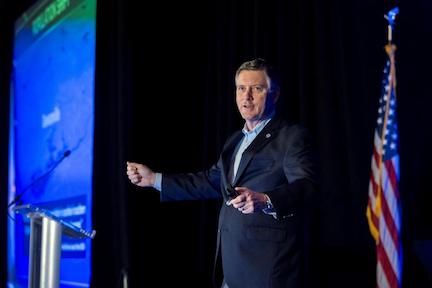The Georgia Ports Authority hosted their 55th annual 2024 Georgia International Trade Conference. The event brings customers, business partners and industry leaders together to discuss the latest maritime and logistics industry developments and trends.
India was one of the key topics discussed on conference panels. The India government is investing billions in port and transportation infrastructure to attract more foreign direct investment, improve supply chains and get the country ready for the future. With the largest population in the world now, overtaking China in 2023 - many companies are expanding their India activities. Major brands like Apple, Walmart, Samsung, Tesla and others are actively pursuing growth strategies to target India as they look to diversify sourcing locations in Southeast Asia. Four services a week connect India with Savannah and eight services a week connect the Indian Subcontinent. Even with vessel diversions around Africa, Georgia Ports is 3-5 days faster than U.S. West Coast ports.

“We are always focused on growth. We want to go above and beyond to build a port that handles both future growth and supply chain disruption. We are creating a safe, trusted harbor for your cargo. Leadership is being able to see what's coming and staying ahead of it," Lynch said during his opening keynote address. At the Georgia Ports, we are building a resilient link in the global logistics chain, one that is ready to withstand any future challenges.”
The renovation of Ocean Terminal in Savannah will start coming online in 2027 and be completed by 2028 transforming the current three small berth facility into two big ship berths. A new $29 million exit ramp for truckers (financed by GPA) direct to the highway means no traffic lights from Ocean Terminal in Savannah all the way to Atlanta. The Talmadge River bridge over the Savannah River will be heightened by the Georgia Department of Transportation by 2028 to allow larger container ships into the port. The future Savannah Container Terminal on Hutchison Island is now in the permitting phase and will create three new big ship berths when completed. These ship berth improvements combined with the recent Garden City Terminal berth one project (which opened in 2023) will deliver a total of 12 big ship berths, representing a 100% increase in big ship berth capacity over the next six years and significantly increase, yard, gate and rail capabilities.
Governor Brian Kemp said “On the backs of three straight record-breaking years for economic development, I’m proud to see the Ports of Savannah and Brunswick continuing to grow and meet the needs of both job creators and consumers,” said Governor Kemp. “Our ports have been an incredible asset in our state’s success and we are committed to their ongoing expansion. As they are projected to become some of the most called upon ports in the world, we look forward to their impact on our entire state and region.”
Georgia Ports Chairman Kent Fountain said “None of these improvements would be successful without the support of Governor Brian Kemp, the GPA team, International Longshoreman's Association and Gateway Terminals employees who work together to deliver unmatched supply chain velocity for Georgia Ports customers. We’re proud of Georgia Ports readiness for the future, investment plan, operations and speed of infrastructure execution.”
Lynch touched on demographics, manufacturing and sourcing trends as key factors driving growth in Georgia and in the U.S. Southeast.
Census data showed Georgia’s population surged in 2022, growing three times faster than the U.S. population. Economists believe that Georgia’s population will continue to grow at a pace that is at least double the national average. This trend coupled with the service area Georgia Ports serves in the fast-growing population of the Southeast region will fuel further demand growth. More and more companies are targeting the Southeast and U.S. Gulf as an attractive place to expand distribution centers. As a national gateway port, Georgia Ports serves the states of Texas, Florida, North Carolina, Georgia, South Carolina, Tennessee and others.
The manufacturing shift trend has seen the State of Georgia attract companies investing in new manufacturing sites and distribution centers. Automotive manufacturing has been a success story in the state. Hyundai’s new Metaplant in Georgia, is a $10 billion total investment (including suppliers) – and will generate 15,000 new jobs. Hyundai is pleased with the speed of the construction at the plant, describing it as the fastest in the world with the first cars scheduled to roll-off the assembly line ahead of schedule in October 2024. The site has attracted an entire automotive logistics ecosystem to the state with 17 Hyundai suppliers selecting and building sites.
Efficiency matters: The Savannah operating model which enables truckers to perform 80% dual moves eliminates 700,000 unproductive truck trips, avoids 10,000 tons of CO2, saves 1 million gallons of diesel fuel – this is sustainability through efficiency.
While disruption may be here to stay, Lynch assured GITC attendees that the Georgia Ports is investing now to ensure the capacity, fluidity and connectivity needed for the future. One that will see the port growing to more than 12M TEUs in capacity by 2030.
Port of Brunswick: Roll-on/Roll-off cargo
The Port of Brunswick currently has $262M in improvements underway to add more space for warehousing and processing. “No other Roll-on/Roll-off terminal in the U.S. has the room to scale up its operation like the Port of Brunswick,” Lynch said. Current annual throughput capacity at Colonel’s Island is 1.0 million units. When fully complete, annual throughput capacity for Colonel’s Island will reach 1.4 million units for a 40% increase.
As part of that expansion, GPA will triple its capacity for high/heavy equipment storage. For autos, another 300 acres are available on terminal for expansion. GPA is also in the process of adding a fourth Ro/Ro berth to handle additional vessels. Currently in the engineering phase, the new berth will more efficiently accommodate modern vessels capable of carrying 7,000-plus vehicles.










